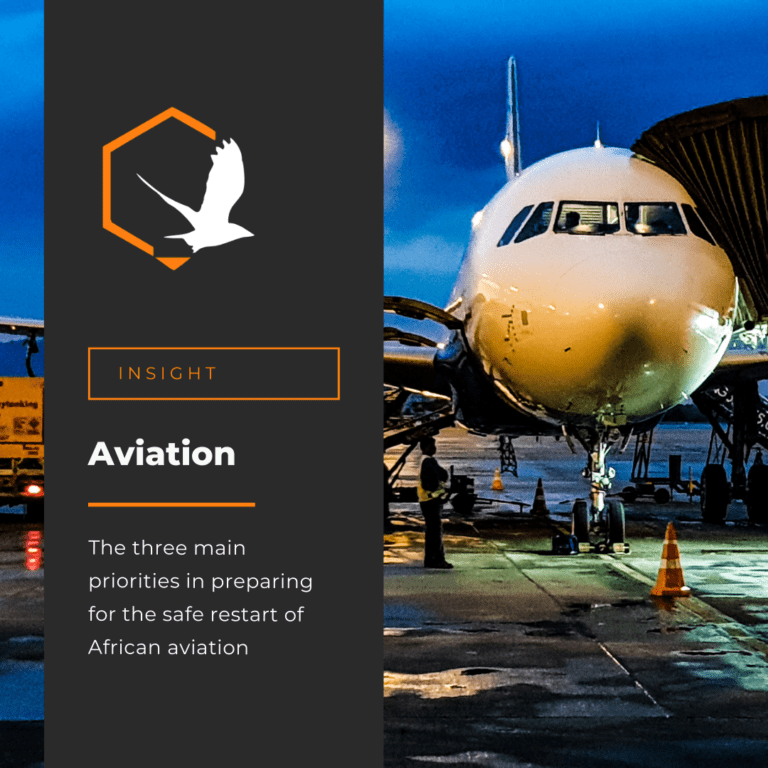Current situation in African Aviation Industry in 2020
- A 69% drop in passenger demand in Africa compared to 66% globally. Passenger demand is back to 1998 levels.
- A 61% drop in capacity in Africa compared to 57% globally.
- Air cargo was a bright spot for African carriers, cargo volumes increased by 1% in Africa, this translates into high cargo revenues, which provided needed support to airlines.
- African airlines lost US$ 2 billion.
- Airlines in Africa lost $49.63 for every passenger they flew in 2020 compared to a loss globally of $66.04.
- Connectivity fell by 90% at the low point of the crisis. Before the crisis there were 970 unique international routes at the low point of the crisis there was 100. And the density of those connections has become much thinner.
- Job losses could grow to 4.5 million in Africa in aviation and related industries.
- GDP could fall by up to $37 billion supported by aviation in the region.
Financial relief, safe reopening of borders, and planning for the safe restart of operations are the main priorities for aviation in Africa.
The International Air Transport Association (IATA) has identified three priorities for African governments to ensure that the airline, travel, and transportation industries survive the COVID-19 crisis and can support economic recovery, growth, and development across the continent.
The main priorities for aviation in Africa are:
- Continued financial relief and the release of committed aid and blocked funds
- Safe reopening of borders
- Planning for the safe restart of operations
Continued financial relief and the release of committed aid and blocked funds
A small number of African airlines will receive US$ 2.04 billion in government assistance in 2020. The majority of this ($2.02 billion) was distributed through direct government loans, equity financing, and cash injections. Despite this, 8 African airlines have declared bankruptcy or entered into business administration in the last 12 months.
International finance agencies and other institutions, including the African Development Bank, African Export Import Bank, African Union, and the International Monetary Fund, have pledged over $30 billion for African air transport and tourism. However, the majority of this assistance has yet to reach airlines and other aviation stakeholders in need. In addition, $ 601 million in airline funds remain blocked in 17 African countries (Algeria, Angola, Benin, Burundi, Central African Republic, Eritrea, Ethiopia, Equatorial Guinea, Malawi, Mozambique, Nigeria, Sudan, Gabon, Cameroon, Chad, Congo, and Zimbabwe), putting additional pressure on airlines struggling for survival.
- African airlines collectively lost US$2 billion in 2020.
- As the struggle with COVID-19 continues, we expect only a slight improvement (US$1.7 billion loss) this year.
- Traffic is unlikely to return to pre-COVID-19 levels until 2023.
- The release of the $ 601 million in airline revenues that are currently being withheld from repatriation by certain governments would provide an immediate boost to some markets.
Financial relief measures, especially those that do not increase the industry’s debt burden, are still desperately needed. Additional relief measures, as well as the activation of previously pledged funds, are critical. Government assistance comes in a variety of forms. Cost savings from taxes and fees will be beneficial. Governments will require a financially viable air transport sector to re-energize economic recovery following COVID-19.
Safe reopening of borders
The African Union has taken the lead in preparing for the safe restart of aviation in Africa through its “Saving Lives, Economies, and Livelihoods” campaign, which promotes collaboration between various government sectors involved in the crisis, including Ministries of Health, Transport, and Information Technology. IATA supports the AU’s efforts and urges African governments to:
Replace quarantine measures with testing
Currently, quarantine measures are in place in 20 African countries. Quarantine, in essence, means that borders are closed. It is critical that African governments implement effective alternatives to quarantine measures, such as pre-departure testing, for international travel, particularly from countries with a similar risk profile.
Accept a reasonable validity period of five (5) days for COVID-19 testing for travel
Considering the waiting period for COVID-19 testing, the turnaround time for results, and the accessibility of testing facilities on the continent, we urge African governments to accept the AU-recommended validity period of five (5) days for COVID-19 testing for cross-continent travel.
Avoid COVID-19 vaccination as a mandatory pre-entry and exit criteria
In line with the WHO, the airline industry does not support mandatory vaccination as a precondition to fly. Many potential travelers, particularly in Africa, cannot be vaccinated or will not have access to vaccines. Along with testing and track & trace capabilities, vaccination can be a tool to support the safe re-opening of borders without quarantine.
Planning for a safe Restart
Preparing the industry to safely restart after a year or more of disruption will take careful planning and advanced preparation. Governments need to develop the benchmarks and plans that would enable a safe, orderly and timely restart. That means working with governments in at least two areas:
Establishing operational restart plans
Safety remains the industry’s main priority and is a critical pre-condition for restarting operations and for the build-up of traffic thereafter. Restarting an airline is not like flipping a switch; as such it is important to understand government plans. Airlines need to ready their crew, technical personnel and aircraft. After a year of lockdowns, this requires refresher training, checks and coordination. On top of that, airlines will need time to market their services so that there are fare-paying passengers when operations resume.
Putting tools in place to manage new COVID-19 testing and vaccine requirements
Testing and vaccinations will play a role as the pandemic comes under control and economies ramp up, including the travel sector. Efficient digital management of health credentials is vital to restart. Manual processes will not be able to cope with volumes once the recovery begins. Digital solutions must be secure, work with existing systems, align with global standards and respect data privacy.
Source and more information visit

